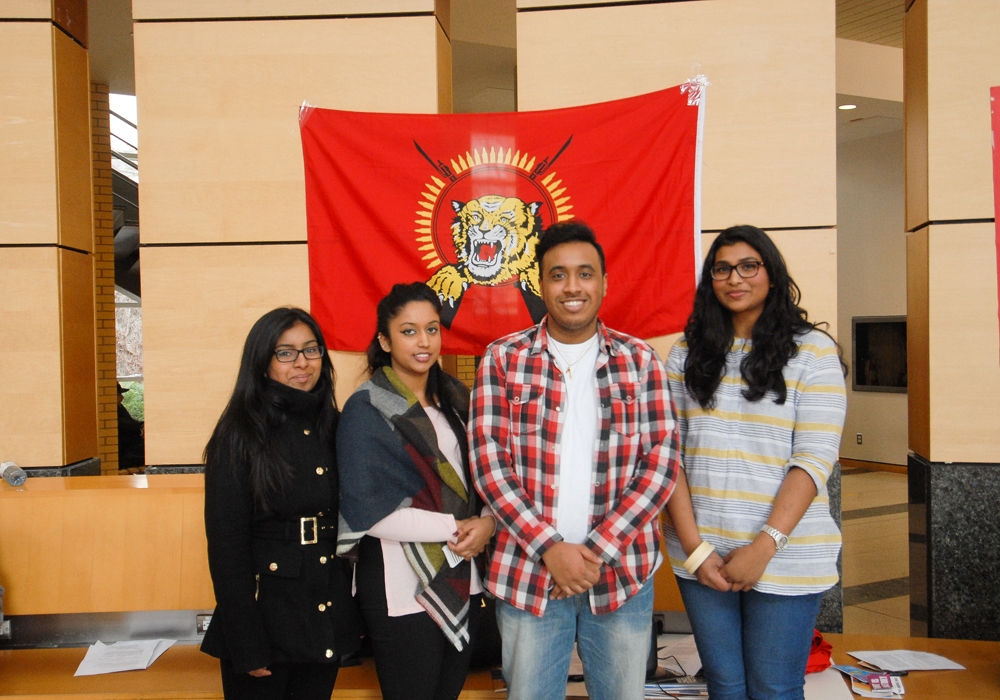Salma Ibrahim, contributor
Featured image courtesy of Salma Ibrahim
Striking images of brutalized Tamil women and children were displayed in Vari Hall on Monday in an exhibition launching Tamil Rights Awareness Week, hosted by the York University Tamil Student Association.
Roshni Raveenthiran, VP equity of YUTSA says that images are meant to provoke people into thinking beyond the mainstream narrative of violence and terrorism associated with the Tamil resistance. The gallery focuses on the gross abuses inflicted on the Tamil people before, during, and after Sri Lanka’s civil war.
The Tamil people are the minority ethnic group in Sri Lanka who engaged in a civil war against the country’s governing Sinhalese population for decades. The Tamil resistance was led by the Liberation Tigers of Tamil Eelam, popularly known as the Tamil Tigers. A 2011 United Nations report found that human rights violations were committed by both the Sinhalese forces and the Tamil rebels in the Sri Lankan conflict. The LTTE were listed as a terrorist organization by Canada in 2006.
Gunesh Sivanathan, president of YUTSA argues that armed resistance was necessary because the depth of violence the Tamil people endured meant they either mobilized or faced ethnic cleansing.
“If they remained silent, there would be no more Tamil people in Sri Lanka. I wouldn’t be here,” he says.
Raveenthiran does not deny violence being perpetrated on both sides, but stands on the principle, by any means necessary.
“We endured decades of oppression and we’ve done peaceful protests, but what has happened is because of the ongoing oppression that we’ve faced,” says Raveenthiran.
“When you’re stripping someone’s identity, when you’re raping women and children and also men in the North and East of Sri Lanka, when you are stripping down their businesses, occupying their property, how would that make [them] feel?”
Raveenthiran reiterates, people can only stay for so long sitting in silent protest against a state which has been imposing such policies for all this time.
“It’s important to know that, yes we don’t agree with violence but, by any means necessary, we had to do it for the self-determination of the Tamils and to make sure that they have safe space and to make sure that the identity was not tarnished.”
As the daughter of a Tamil Eelam diaspora, Raveenthiran says, “It’s important to talk about this because we know that the LTTE and the armed struggle and the folks in the North and East have actually shaped our identity and [it’s] because of them we are here.”
Sivanathan agrees raising awareness on this issue is important because he has experienced the consequences of ignorance firsthand.
Sivanathan says that during a BDS protest in 2013, York security approached him and told him he could not raise the Tamil flag because it was a terrorist flag. However, the Tamil flag is different from the LTTE flag. He says he and a friend informed the security officer of this but York Security still reprimanded YUTSA in a follow up letter.
York says it has no issue with the Tamil flag being raised. Janice Walls, York media, says, “Any concerns that may have been expressed in the past were not consistent with the position of the university.”
YUTSA say the oppression and marginalization of the Tamil people continues even though the war has officially ended. They ask the York community at large to listen to their stories and think about “why they continue to fight against all odds.”
Tamil Rights Awareness Week takes place from February 29 to March 3. It includes a movie screening of My Daughter the Terrorist, a discussion on mental health in Tamil communities, a poetry night, and a Tamil Women Uprising panel.
Follow us on instagram, @excalphotos




